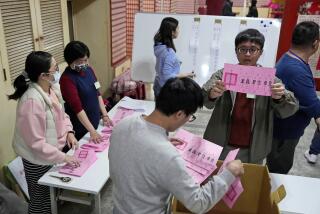Debunking the Myths Behind Tiananmen Crisis
- Share via
WASHINGTON — Friday will mark the 10th anniversary of the terrifying night when Chinese troops shot their way into Beijing, eradicating once and for all the protests in Tiananmen Square and in many other Chinese cities that spring.
Over the last decade, a series of myths has emerged about the meaning of the events of June 4, 1989, and about this country’s reaction to them. These are the sorts of comforting bromides that enable Americans to avert their eyes from the ugliness of what transpired. Let’s examine some of them:
Myth No. 1: Americans and the rest of the world reacted so strongly to the massacre because they witnessed it on television.
The truth is that the carnage of that night was never seen on TV. In fact, if it had been, the public reaction would have been even more intense.
TV cameras were positioned in Tiananmen Square and to the east of the Square, in and around the Beijing Hotel. The real violence and the overwhelming share of the deaths occurred as troops shot their way along the streets a few blocks to the west of Tiananmen Square, well out of the range of foreign news cameras.
The death toll is still uncertain. After canvassing Beijing hospitals, the Chinese Red Cross came up with a figure of 2,600 dead and 7,000 wounded. The Chinese organization, apparently under pressure from the regime, disavowed this figure.
But a confidential analysis by the U.S. Embassy in Beijing in late June 1989, said the death toll was far more than Chinese estimates and was “probably over 1,000.” The same embassy cable, released this week by the National Security Archive, also said the U.S. military attache in Beijing thought the Red Cross figure was “not an unreasonable estimate.”
Myth No. 2: The Chinese students who led the Tiananmen Square demonstrations were too radical.
The students were certainly inexperienced and tactically obtuse. They misjudged the Chinese leadership. But extreme? Hardly. It was clear that they would have been satisfied with some dialogue with the leadership. They weren’t asking for the Communist Party to give up power, but rather to accept that its power was less than absolute.
“Breaking the government was never really on the agenda,” author Ian Buruma wrote last week in a penetrating essay on Chinese dissidents in the New Yorker magazine. That fact seemed obvious at the time, but over the last decade, it seems to have been lost.
Myth No. 3: The Chinese leadership handled the demonstrations in a clumsy way; the regime erred because it didn’t have sophisticated riot-control techniques.
This is the “sorry, no tear gas” excuse first offered by then-Premier Li Peng a month after the massacre. He claimed the army was obliged to use force because it didn’t have enough tear gas, rubber bullets or water cannon. Chinese officials still repeat this line today, and some credulous Americans have accepted it.
The argument is ludicrous. The regime had used tear gas before, and it could easily have obtained as much as it needed during the weeks in which the crackdown was being planned. Furthermore, by late May 1989, the Tiananmen demonstrations were petering out. The numbers had dwindled from many hundreds of thousands to a few thousand. Lethal force was utterly unnecessary.
But the Communist Party leadership did not want to minimize casualties. With Chinese workers beginning to take part in the demonstrations and with party members and government officials beginning to support the students, the regime wanted to terrify the country into submission. Only bullets could have accomplished this purpose. They did.
Myth No. 4: The Tiananmen crackdown was a “tragedy” for the Chinese leadership.
The word “tragedy” first appeared in official American statements immediately after the massacre and has been used regularly ever since. Yet for the Chinese leadership, the bloody events were anything but a tragedy.
Under the old, classical Greek definition, a tragedy occurs when a person makes a choice that defies the gods and turns out to have unforeseen, disastrous consequences. In the watered-down modern definition, a tragedy is simply a serious mishap.
Neither definition fits. When the Chinese regime cracked down, it got precisely the consequences it intended: perpetuation of the Communist Party’s monopoly on power.
Indeed, when Secretary of State James A. Baker III once made the mistake of referring to the events as a “tragedy,” Li cut him short. “The actions in Tiananmen Square were a good thing,” Li said. “We do not regard them as a tragedy.”
Looking back now, we can see what we couldn’t then: that in 1989, the Chinese Communist Party was choosing a fundamentally different path from that of its counterparts in Eastern Europe and the Soviet Union. Rather than resort to violence, most of the other regimes were willing to share or, ultimately, give up power. The rulers of China were not.
More to Read
Sign up for Essential California
The most important California stories and recommendations in your inbox every morning.
You may occasionally receive promotional content from the Los Angeles Times.













